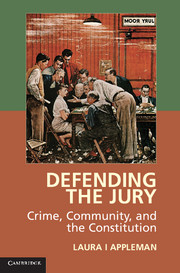Book contents
- Frontmatter
- Contents
- Acknowledgments
- 1 Introduction
- Part I History in the Crucible: Rediscovering the Original Community Right in Criminal Justice
- Part II Old Becomes New: Sixth Amendment Jury Rights and Twenty-First-Century Criminal Procedure
- Part III Theory into Practice: Origins and Community in Modern Criminal Procedure
- 6 Bail, Jail, and the Community Voice
- 7 Infusing Community through Criminal Procedure: The Plea Jury
- 8 Eradicating the Bench Trial
- 9 Restoring the Offender to Society
- 10 Back-End Sentencing: The Sixth Amendment and Post-Prison Procedures
- 11 Jury Nullification and Victim Rights: Going Past Procedure
- 12 Conclusion
- Selected Bibliography
- Index
- References
7 - Infusing Community through Criminal Procedure: The Plea Jury
Published online by Cambridge University Press: 05 April 2015
- Frontmatter
- Contents
- Acknowledgments
- 1 Introduction
- Part I History in the Crucible: Rediscovering the Original Community Right in Criminal Justice
- Part II Old Becomes New: Sixth Amendment Jury Rights and Twenty-First-Century Criminal Procedure
- Part III Theory into Practice: Origins and Community in Modern Criminal Procedure
- 6 Bail, Jail, and the Community Voice
- 7 Infusing Community through Criminal Procedure: The Plea Jury
- 8 Eradicating the Bench Trial
- 9 Restoring the Offender to Society
- 10 Back-End Sentencing: The Sixth Amendment and Post-Prison Procedures
- 11 Jury Nullification and Victim Rights: Going Past Procedure
- 12 Conclusion
- Selected Bibliography
- Index
- References
Summary
The preceding chapters arguing for a collective jury right have all raised one overarching question: In a world of guilty pleas, how important can this community right to the jury trial right be? In response, this chapter explores how the Court’s new jury-centered philosophy of punishment affects the procedures of the guilty plea – by far the most common way of adjudicating criminal indictments. Although the Court focused its analysis on community participation in juries, I conclude that there is nothing in Apprendi-Blakely or its progeny to suggest that this type of participation should be limited only to the criminal trial. Thus, a logical next step in following the dictates of the jury trial right is the incorporation of the community into the guilty plea procedure, through the use of a plea jury.
The Court’s recent concentration on the jury and the rights of the community applies to all aspects of criminal process, as the Court has continually taken pains to point out. It goes without saying that the function of the petit jury – to represent the community – is deeply entwined with our general understanding of legitimacy, democracy, and punishment. And the Court’s reliance on the historical origins of the criminal’s jury trial signifies a return to a more robust community right. But this community right has been almost completely excised from modern criminal process, the guilty plea procedure being the most dramatic example.
- Type
- Chapter
- Information
- Defending the JuryCrime, Community, and the Constitution, pp. 124 - 158Publisher: Cambridge University PressPrint publication year: 2015



